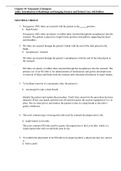Exam (elaborations)
Introduction to Radiologic and Imaging Sciences and Patient Care, 6th Edition| Alder Test Bank| Chapter 19: Nonaseptic Techniques
- Course
- Institution
- Book
Introduction to Radiologic and Imaging Sciences and Patient Care, 6th Edition| Alder Test Bank| Chapter 19: Nonaseptic Techniques| 1. Nasogastric (NG) tubes are inserted with the patient in the position. b. high Fowler Nasogastric (NG) tubes are plastic or rubber tubes inserted through the nasoph...
[Show more]



